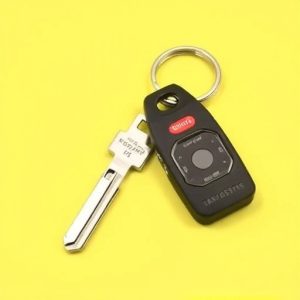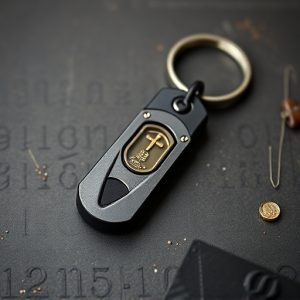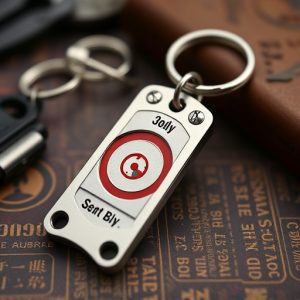Keychain Weapon Permits: State-by-State Legal Carry Guidelines
In the US, state-specific Keychain Weapon Permit Requirements govern the accessibility and condition…….
In the US, state-specific Keychain Weapon Permit Requirements govern the accessibility and conditions for carrying defensive keychain weapons, including background checks, age limits, training, and carry restrictions. These laws vary widely from state to state, with some allowing non-lethal devices without a permit while others mandate permits for any form of keychain weapon. Eligibility generally requires being at least 18, having no disqualifying records, passing a background check, and demonstrating safety proficiency. The application process involves checking local laws, providing ID, paying fees, and possibly completing a training course. Keychain weapons are not designed for concealed carry or combat but as legal everyday tools; responsible ownership and understanding local regulations are paramount.
“Uncovering the intricacies of defensive keychain legal carry guidelines across states is essential for every firearm enthusiast. This comprehensive guide aims to demystify the diverse regulations surrounding keychain weapon permits, offering a state-by-state breakdown. From understanding the fundamental laws to exploring eligibility criteria and application processes, we provide an in-depth analysis.
Learn about the key requirements, dispel common myths, and gain insights into frequently asked questions. Whether you’re a seasoned shooter or new to the concept, this article is your go-to resource for navigating the legal landscape of keychain weapon permits.”
- Understanding Keychain Weapon Permit Laws: An Overview
- State-by-State Requirements for Legal Carry
- Eligibility Criteria: Who Qualifies for a Permits?
- Application Process and Necessary Documents
- Common Misconceptions and Frequently Asked Questions
Understanding Keychain Weapon Permit Laws: An Overview
The concept of carrying a defensive keychain weapon is governed by specific legal frameworks known as Keychain Weapon Permit Requirements. These laws vary significantly across different states, shaping the accessibility and conditions under which such devices can be legally carried. Understanding these requirements is crucial for ensuring compliance and promoting responsible ownership.
Keychain weapon permit laws typically involve background checks, training, age restrictions, and specific circumstances under which these devices can be openly or concealed carried. Some states allow for unrestricted carry, while others mandate a permit that requires individuals to complete safety courses and pass rigorous screening processes. Awareness of these requirements is essential for citizens looking to exercise their right to self-defense while adhering to the legal framework designed to maintain public safety.
State-by-State Requirements for Legal Carry
In the United States, regulations surrounding the legal carry of keychain weapons vary significantly from state to state, with each having its own set of keychain weapon permit requirements. Understanding these guidelines is crucial for those looking to legally carry a self-defense tool on their keys. Some states have relatively relaxed laws, allowing residents to carry certain types of keychain weapons without a permit. These often include small, non-lethal devices like pepper spray or personal stun guns. On the other hand, many states have stringent requirements, mandating that individuals obtain a permit before legally carrying any form of keychain weapon.
When navigating state-by-state requirements for legal carry, it’s essential to familiarize yourself with local laws. This may involve researching specific keychain weapon permit requirements, background check procedures, and waiting periods. Some states might also impose restrictions on the type of device considered legal, the amount of force it can exert, or where it can be carried. Staying informed about these nuances ensures compliance with the law and promotes responsible ownership of self-defense tools.
Eligibility Criteria: Who Qualifies for a Permits?
In many states, eligibility for a keychain weapon permit is determined by specific legal criteria. Generally, individuals looking to obtain such a permit must meet certain age requirements, often being at least 18 years old. They should also have no disqualifying criminal records or history of violent offenses. Additionally, applicants typically need to pass a background check and demonstrate proficiency in basic safety and handling practices.
Keychain weapon permit requirements may vary slightly from state to state, but they are designed to ensure responsible gun ownership. Applicants might be required to complete a training course covering firearm safety and use, and they must adhere to strict rules regarding the type of weapons permissible under such permits. These guidelines aim to promote public safety while respecting the rights of law-abiding citizens to carry self-defense tools responsibly.
Application Process and Necessary Documents
Obtaining a defensive keychain legal carry permit involves a straightforward application process, but it requires gathering specific documents to ensure compliance with state regulations. The first step is to check your local or state laws regarding keychain weapons permits to understand the specific requirements in your area. Generally, applicants must be of legal age, pass a background check, and demonstrate proficiency in handling and safety practices.
Keychain weapon permit requirements often include submitting an application form, providing valid identification, and potentially paying a fee. Some jurisdictions may mandate a training course or proof of completion from a certified self-defense or firearms instructor. It’s crucial to ensure that all documents are accurate and up-to-date, including any relevant permits or licenses for other weapons. Additionally, maintaining a clean record free from felonies or significant misdemeanors is typically essential to qualify for a defensive keychain legal carry permit.
Common Misconceptions and Frequently Asked Questions
Common Misconceptions and Frequently Asked Questions
One common misconception is that a defensive keychain is a hidden weapon, allowing users to carry a knife or gun discreetly for self-defense purposes. However, it’s crucial to understand that these keychains are typically legal only when used as a personal accessory—a small tool designed for everyday tasks rather than combat. They aren’t meant for concealed carry or as a primary means of protection.
Another frequent query revolves around keychain weapon permit requirements. In many states, permits for carrying defensive keychains are not necessary if they remain attached to your keys and used solely for lawful purposes like opening bottles or cutting tape. Still, local laws vary, so it’s essential to check your region’s specific regulations. Always keep in mind that responsible ownership and understanding the law are paramount when considering a defensive keychain as a personal safety tool.
Understanding the legal framework surrounding keychain weapon permits is crucial for ensuring compliance with state-specific guidelines. Each state has its own set of requirements, ranging from eligibility criteria to application processes, making it essential to know your rights and responsibilities. By familiarizing yourself with these keychain weapon permit requirements, you can navigate the process confidently and legally carry your self-defense tool when permitted by local laws. Remember, knowledge is power when it comes to protecting yourself and your loved ones.


